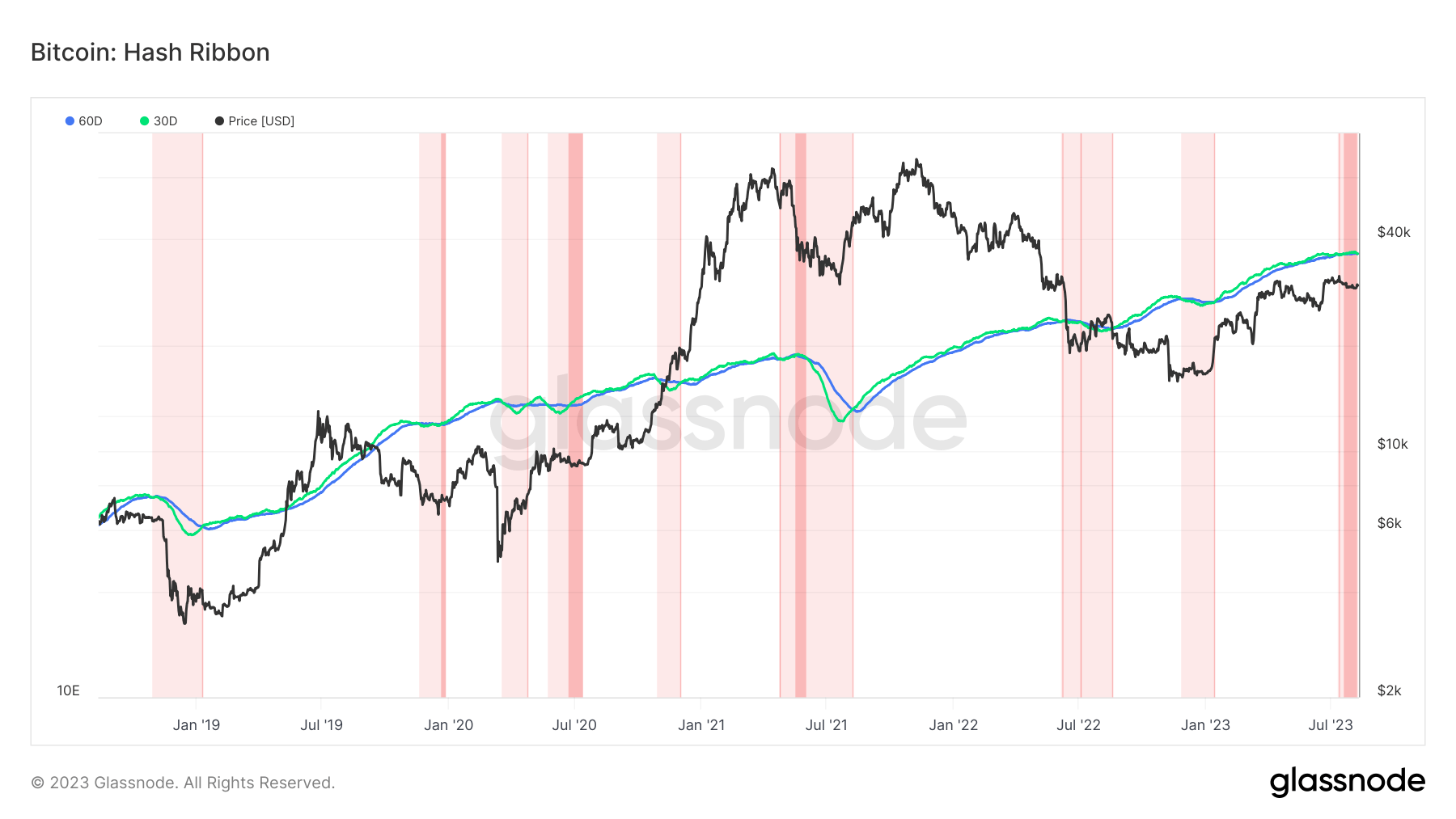The Bitcoin mining industry serves as a critical barometer for market health and direction. Among the various tools employed to analyze this vital sector, hash ribbons stand out for their nuanced insights into the state of Bitcoin miners.
Hash Ribbons are a technical indicator that compares two moving averages of Bitcoin’s hash rate: the 30-day simple moving average (30D-SMA) and the 60-day double moving average (60D-DMA).
The hash rate represents the total computational power used to process and validate transactions on the Bitcoin network. Measured in hashes per second (H/s), it directly indicates the network’s security and the miners’ activity.
Analyzing Bitcoin hash rate
Tracking the 30-day simple moving average (30D-SMA) and the 60-day double moving average (60D-DMA) of the hash rate provides insights into short-term and long-term trends in mining activity.
The 30D-SMA offers a view of the recent mining landscape, reflecting short-term fluctuations, while the 60D-DMA smooths out those fluctuations to reveal underlying trends. Together, these metrics form the Hash Ribbons, helping to identify potential miner capitulation or recovery.
When the 30D-SMA falls below the 60D-DMA, it signals a period of acute miner income stress, known as a negative inversion. Conversely, a positive inversion occurs when the 30D-SMA rises above the 60D-DMA, indicating a recovery period and increased profitability for miners.
Since July 2023, the hash ribbons have been almost entirely flat, with the 30D-SMA and the 60D-DMA touching and having nearly the same values.
This flat pattern indicates a balanced and stagnant phase in the Bitcoin mining industry. It has mirrored a lack of clear direction in Bitcoin’s price, with the cryptocurrency trading between $28,000 and $30,000 in a tight range.
What it means
The implications of this equilibrium are multifaceted. On the one hand, the stability in the mining industry suggests a lack of significant stress, which can be seen as a positive sign for the overall health of the Bitcoin network.
On the other hand, the absence of clear momentum in either direction reflects a market in a state of uncertainty, potentially awaiting a catalyst to move.
The current flat pattern observed in the hash ribbons might indicate a consolidation phase, suggesting that the market is holding. However, it’s also important to note that such patterns may precede a significant market breakout or breakdown.
Historically, prolonged periods of tight trading ranges accompanied by flat hash ribbons often lead to substantial price movements once a clear direction was established.

The post Bitcoin’s tight trading range mirrored by flat hash ribbons signals impending market movement appeared first on CryptoSlate.
Credit: Source link





















 Bitcoin
Bitcoin  Ethereum
Ethereum  XRP
XRP  Tether
Tether  Solana
Solana  USDC
USDC  Dogecoin
Dogecoin  Cardano
Cardano  Lido Staked Ether
Lido Staked Ether  TRON
TRON  Wrapped Bitcoin
Wrapped Bitcoin  Wrapped stETH
Wrapped stETH  Chainlink
Chainlink  Avalanche
Avalanche  Sui
Sui  Stellar
Stellar  Litecoin
Litecoin  Shiba Inu
Shiba Inu  Toncoin
Toncoin  Hedera
Hedera  LEO Token
LEO Token  USDS
USDS  Hyperliquid
Hyperliquid  WETH
WETH  Polkadot
Polkadot  MANTRA
MANTRA  Bitcoin Cash
Bitcoin Cash  Bitget Token
Bitget Token  Ethena USDe
Ethena USDe  Wrapped eETH
Wrapped eETH  Uniswap
Uniswap  Monero
Monero  NEAR Protocol
NEAR Protocol  Pepe
Pepe  WhiteBIT Coin
WhiteBIT Coin  Aave
Aave  Ondo
Ondo  Bittensor
Bittensor  Aptos
Aptos  Internet Computer
Internet Computer  Dai
Dai  Official Trump
Official Trump  Ethereum Classic
Ethereum Classic  Tokenize Xchange
Tokenize Xchange  Mantle
Mantle  OKB
OKB  Gate
Gate  sUSDS
sUSDS  Coinbase Wrapped BTC
Coinbase Wrapped BTC 
